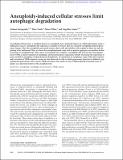Aneuploidy-induced cellular stresses limit autophagic degradation
Author(s)
Santaguida, Stefano; Vasile, Eliza; White, Eileen; Amon, Angelika B
DownloadSantaguida-2015-Aneuploidy-induced c.pdf (1.315Mb)
PUBLISHER_CC
Publisher with Creative Commons License
Creative Commons Attribution
Terms of use
Metadata
Show full item recordAbstract
An unbalanced karyotype, a condition known as aneuploidy, has a profound impact on cellular physiology and is a hallmark of cancer. Aneuploid cells experience a number of stresses that are caused by aneuploidy-induced proteomic changes. How the aneuploidy-associated stresses affect cells and whether cells respond to them are only beginning to be understood. Here we show that autophagosomal cargo such as protein aggregates accumulate within lysosomes in aneuploid cells. This causes a lysosomal stress response. Aneuploid cells activate the transcription factor TFEB, a master regulator of autophagic and lysosomal gene expression, thereby increasing the expression of genes needed for autophagy-mediated protein degradation. Accumulation of autophagic cargo within the lysosome and activation of TFEB-responsive genes are also observed in cells in which proteasome function is inhibited, suggesting that proteotoxic stress causes TFEB activation. Our results reveal a TFEB-mediated lysosomal stress response as a universal feature of the aneuploid state.
Date issued
2015-09Department
Massachusetts Institute of Technology. Department of Biology; Koch Institute for Integrative Cancer Research at MITJournal
Genes & Development
Publisher
Cold Spring Harbor Laboratory Press
Citation
Santaguida, Stefano, Eliza Vasile, Eileen White, and Angelika Amon. “Aneuploidy-Induced Cellular Stresses Limit Autophagic Degradation.” Genes Dev. 29, no. 19 (September 24, 2015): 2010–2021.
Version: Final published version
ISSN
0890-9369
1549-5477